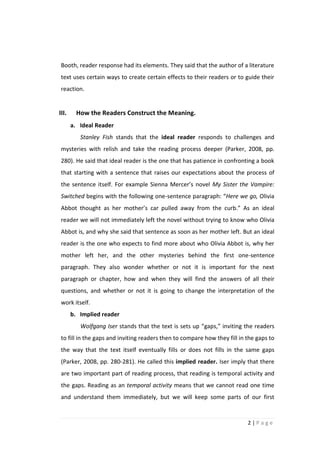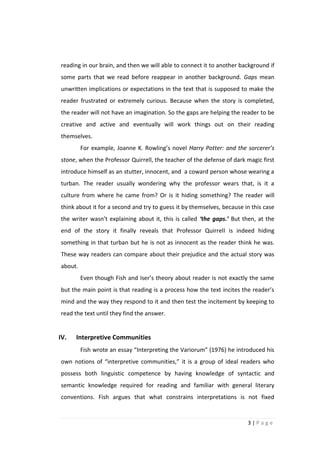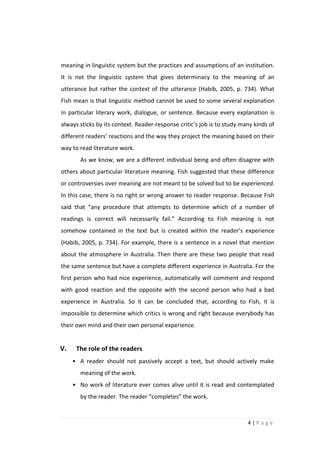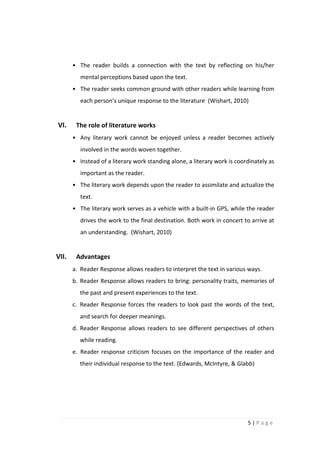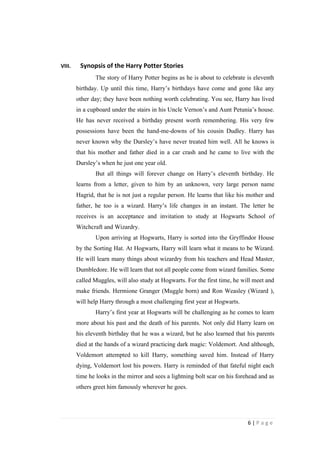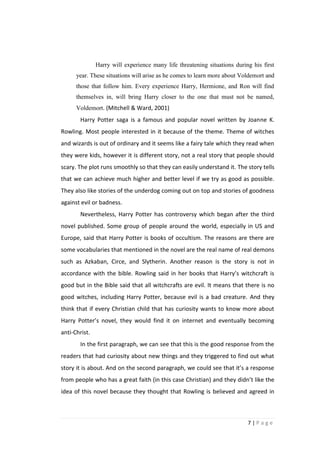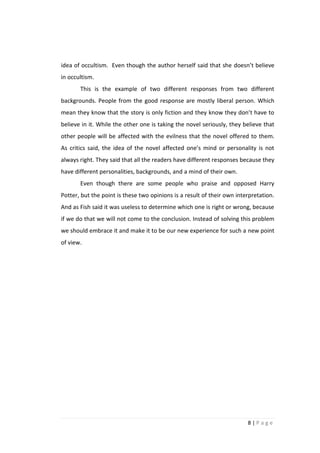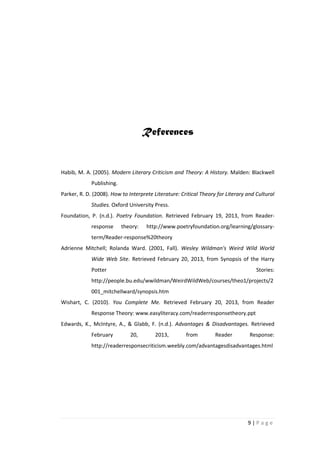Makalah reader response
- 1. Reader Response I. Definition Reader response is a theory that focuses on the reader reaction to literature works. The reader-response criticism had some special interest for the readers because; critics should also know why we, as a reader, have different responses. They assumed that they should know the readerâs backgrounds to understand what causes and why they respond in a certain way to some literature works. They also see how the reader-response criticismâs point of view on how the audiences read situation on what they are reading that time. It has raise a several questions about how they know the way the readers read a book and what are they reading in the first place until they can response in such certain way. II. History This theory appeared in the late 1960s and the 1970s but the role of the reader or audience of a literary work or performance has been recognized since classical times (Habib, 2005, p. 708). However, people didnât know how important the role of the reader is. They thought readers consumed passively what they read. For example Plato knew that peopleâs mind could be directed to a good or bad behavior by poetry. While Aristotle thought that: a tragedy must inspire the purgative emotions of fear and pity (Habib, 2005, p. 708). In the past, they thought that the readers only has one response, which is the authorâs prediction what would they response. Reader-response theory is a reaction against formalism and objectivism. This theory is a restoration of an old and more traditional knowledge of an audienceâs important role to such literary or rhetorical situation. According to Virginia Woolf, Louise Rosenblatt, and Wayne 1|Page
- 2. Booth, reader response had its elements. They said that the author of a literature text uses certain ways to create certain effects to their readers or to guide their reaction. III. How the Readers Construct the Meaning. a. Ideal Reader Stanley Fish stands that the ideal reader responds to challenges and mysteries with relish and take the reading process deeper (Parker, 2008, pp. 280). He said that ideal reader is the one that has patience in confronting a book that starting with a sentence that raises our expectations about the process of the sentence itself. For example Sienna Mercerâs novel My Sister the Vampire: Switched begins with the following one-sentence paragraph: âHere we go, Olivia Abbot thought as her motherâs car pulled away from the curb.â As an ideal reader we will not immediately left the novel without trying to know who Olivia Abbot is, and why she said that sentence as soon as her mother left. But an ideal reader is the one who expects to find more about who Olivia Abbot is, why her mother left her, and the other mysteries behind the first one-sentence paragraph. They also wonder whether or not it is important for the next paragraph or chapter, how and when they will find the answers of all their questions, and whether or not it is going to change the interpretation of the work itself. b. Implied reader Wolfgang Iser stands that the text is sets up âgaps,â inviting the readers to fill in the gaps and inviting readers then to compare how they fill in the gaps to the way that the text itself eventually fills or does not fills in the same gaps (Parker, 2008, pp. 280-281). He called this implied reader. Iser imply that there are two important part of reading process, that reading is temporal activity and the gaps. Reading as an temporal activity means that we cannot read one time and understand them immediately, but we will keep some parts of our first 2|Page
- 3. reading in our brain, and then we will able to connect it to another background if some parts that we read before reappear in another background. Gaps mean unwritten implications or expectations in the text that is supposed to make the reader frustrated or extremely curious. Because when the story is completed, the reader will not have an imagination. So the gaps are helping the reader to be creative and active and eventually will work things out on their reading themselves. For example, Joanne K. Rowlingâs novel Harry Potter: and the sorcererâs stone, when the Professor Quirrell, the teacher of the defense of dark magic first introduce himself as an stutter, innocent, and a coward person whose wearing a turban. The reader usually wondering why the professor wears that, is it a culture from where he came from? Or is it hiding something? The reader will think about it for a second and try to guess it by themselves, because in this case the writer wasnât explaining about it, this is called âthe gaps.â But then, at the end of the story it finally reveals that Professor Quirrell is indeed hiding something in that turban but he is not as innocent as the reader think he was. These way readers can compare about their prejudice and the actual story was about. Even though Fish and Iserâs theory about reader is not exactly the same but the main point is that reading is a process how the text incites the readerâs mind and the way they respond to it and then test the incitement by keeping to read the text until they find the answer. IV. Interpretive Communities Fish wrote an essay âInterpreting the Variorumâ (1976) he introduced his own notions of âinterpretive communities,â it is a group of ideal readers who possess both linguistic competence by having knowledge of syntactic and semantic knowledge required for reading and familiar with general literary conventions. Fish argues that what constrains interpretations is not fixed 3|Page
- 4. meaning in linguistic system but the practices and assumptions of an institution. It is not the linguistic system that gives determinacy to the meaning of an utterance but rather the context of the utterance (Habib, 2005, p. 734). What Fish mean is that linguistic method cannot be used to some several explanation in particular literary work, dialogue, or sentence. Because every explanation is always sticks by its context. Reader-response criticâs job is to study many kinds of different readersâ reactions and the way they project the meaning based on their way to read literature work. As we know, we are a different individual being and often disagree with others about particular literature meaning. Fish suggested that these difference or controversies over meaning are not meant to be solved but to be experienced. In this case, there is no right or wrong answer to reader response. Because Fish said that âany procedure that attempts to determine which of a number of readings is correct will necessarily fail.â According to Fish meaning is not somehow contained in the text but is created within the readerâs experience (Habib, 2005, p. 734). For example, there is a sentence in a novel that mention about the atmosphere in Australia. Then there are these two people that read the same sentence but have a complete different experience in Australia. For the first person who had nice experience, automatically will comment and respond with good reaction and the opposite with the second person who had a bad experience in Australia. So it can be concluded that, according to Fish, it is impossible to determine which critics is wrong and right because everybody has their own mind and their own personal experience. V. The role of the readers âĒ A reader should not passively accept a text, but should actively make meaning of the work. âĒ No work of literature ever comes alive until it is read and contemplated by the reader. The reader âcompletesâ the work. 4|Page
- 5. âĒ The reader builds a connection with the text by reflecting on his/her mental perceptions based upon the text. âĒ The reader seeks common ground with other readers while learning from each personâs unique response to the literature (Wishart, 2010) VI. The role of literature works âĒ Any literary work cannot be enjoyed unless a reader becomes actively involved in the words woven together. âĒ Instead of a literary work standing alone, a literary work is coordinately as important as the reader. âĒ The literary work depends upon the reader to assimilate and actualize the text. âĒ The literary work serves as a vehicle with a built-in GPS, while the reader drives the work to the final destination. Both work in concert to arrive at an understanding. (Wishart, 2010) VII. Advantages a. Reader Response allows readers to interpret the text in various ways. b. Reader Response allows readers to bring: personality traits, memories of the past and present experiences to the text. c. Reader Response forces the readers to look past the words of the text, and search for deeper meanings. d. Reader Response allows readers to see different perspectives of others while reading. e. Reader response criticism focuses on the importance of the reader and their individual response to the text. (Edwards, McIntyre, & Glabb) 5|Page
- 6. VIII. Synopsis of the Harry Potter Stories The story of Harry Potter begins as he is about to celebrate is eleventh birthday. Up until this time, Harryâs birthdays have come and gone like any other day; they have been nothing worth celebrating. You see, Harry has lived in a cupboard under the stairs in his Uncle Vernonâs and Aunt Petuniaâs house. He has never received a birthday present worth remembering. His very few possessions have been the hand-me-downs of his cousin Dudley. Harry has never known why the Dursleyâs have never treated him well. All he knows is that his mother and father died in a car crash and he came to live with the Dursleyâs when he just one year old. But all things will forever change on Harryâs eleventh birthday. He learns from a letter, given to him by an unknown, very large person name Hagrid, that he is not just a regular person. He learns that like his mother and father, he too is a wizard. Harryâs life changes in an instant. The letter he receives is an acceptance and invitation to study at Hogwarts School of Witchcraft and Wizardry. Upon arriving at Hogwarts, Harry is sorted into the Gryffindor House by the Sorting Hat. At Hogwarts, Harry will learn what it means to be Wizard. He will learn many things about wizardry from his teachers and Head Master, Dumbledore. He will learn that not all people come from wizard families. Some called Muggles, will also study at Hogwarts. For the first time, he will meet and make friends. Hermione Granger (Muggle born) and Ron Weasley (Wizard ), will help Harry through a most challenging first year at Hogwarts. Harryâs first year at Hogwarts will be challenging as he comes to learn more about his past and the death of his parents. Not only did Harry learn on his eleventh birthday that he was a wizard, but he also learned that his parents died at the hands of a wizard practicing dark magic: Voldemort. And although, Voldemort attempted to kill Harry, something saved him. Instead of Harry dying, Voldemort lost his powers. Harry is reminded of that fateful night each time he looks in the mirror and sees a lightning bolt scar on his forehead and as others greet him famously wherever he goes. 6|Page
- 7. Harry will experience many life threatening situations during his first year. These situations will arise as he comes to learn more about Voldemort and those that follow him. Every experience Harry, Hermione, and Ron will find themselves in, will bring Harry closer to the one that must not be named, Voldemort. (Mitchell & Ward, 2001) Harry Potter saga is a famous and popular novel written by Joanne K. Rowling. Most people interested in it because of the theme. Theme of witches and wizards is out of ordinary and it seems like a fairy tale which they read when they were kids, however it is different story, not a real story that people should scary. The plot runs smoothly so that they can easily understand it. The story tells that we can achieve much higher and better level if we try as good as possible. They also like stories of the underdog coming out on top and stories of goodness against evil or badness. Nevertheless, Harry Potter has controversy which began after the third novel published. Some group of people around the world, especially in US and Europe, said that Harry Potter is books of occultism. The reasons are there are some vocabularies that mentioned in the novel are the real name of real demons such as Azkaban, Circe, and Slytherin. Another reason is the story is not in accordance with the bible. Rowling said in her books that Harryâs witchcraft is good but in the Bible said that all witchcrafts are evil. It means that there is no good witches, including Harry Potter, because evil is a bad creature. And they think that if every Christian child that has curiosity wants to know more about Harry Potterâs novel, they would find it on internet and eventually becoming anti-Christ. In the first paragraph, we can see that this is the good response from the readers that had curiosity about new things and they triggered to find out what story it is about. And on the second paragraph, we could see that itâs a response from people who has a great faith (in this case Christian) and they didnât like the idea of this novel because they thought that Rowling is believed and agreed in 7|Page
- 8. idea of occultism. Even though the author herself said that she doesnât believe in occultism. This is the example of two different responses from two different backgrounds. People from the good response are mostly liberal person. Which mean they know that the story is only fiction and they know they donât have to believe in it. While the other one is taking the novel seriously, they believe that other people will be affected with the evilness that the novel offered to them. As critics said, the idea of the novel affected oneâs mind or personality is not always right. They said that all the readers have different responses because they have different personalities, backgrounds, and a mind of their own. Even though there are some people who praise and opposed Harry Potter, but the point is these two opinions is a result of their own interpretation. And as Fish said it was useless to determine which one is right or wrong, because if we do that we will not come to the conclusion. Instead of solving this problem we should embrace it and make it to be our new experience for such a new point of view. 8|Page
- 9. References Habib, M. A. (2005). Modern Literary Criticism and Theory: A History. Malden: Blackwell Publishing. Parker, R. D. (2008). How to Interprete Literature: Critical Theory for Literary and Cultural Studies. Oxford University Press. Foundation, P. (n.d.). Poetry Foundation. Retrieved February 19, 2013, from Reader- response theory: http://www.poetryfoundation.org/learning/glossary- term/Reader-response%20theory Adrienne Mitchell; Rolanda Ward. (2001, Fall). Wesley Wildman's Weird Wild World Wide Web Site. Retrieved February 20, 2013, from Synopsis of the Harry Potter Stories: http://people.bu.edu/wwildman/WeirdWildWeb/courses/theo1/projects/2 001_mitchellward/synopsis.htm Wishart, C. (2010). You Complete Me. Retrieved February 20, 2013, from Reader Response Theory: www.easyliteracy.com/readerresponsetheory.ppt Edwards, K., McIntyre, A., & Glabb, F. (n.d.). Advantages & Disadvantages. Retrieved February 20, 2013, from Reader Response: http://readerresponsecriticism.weebly.com/advantagesdisadvantages.html 9|Page


